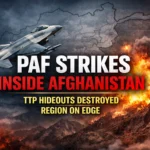By Ch.Haroon Rashid
The Gulf region is not only an energy hub but also a critical stage for global intelligence rivalries. India’s external intelligence agency, the Research and Analysis Wing (RAW), has quietly expanded its presence in the Middle East, often hidden behind the massive wave of Indian migration. Millions of expatriates work in Saudi Arabia, the UAE, Kuwait, and Oman a demographic India uses as both an economic lifeline and a cover for espionage operations.
This article explores how RAW’s covert network functions in the Gulf states, its espionage against Pakistan and China, the documented cases where it was exposed, and the wider security risks for the Middle East.
RAW’s Strategic Use of Migration in the Gulf
The Indian diaspora in the Gulf, one of the world’s largest expatriate communities, provides a dual advantage for New Delhi:
- Economic leverage: Remittances from Indian workers form a major source of foreign income.
- Intelligence shield: RAW embeds operatives within this diaspora, making them nearly invisible to host nations.
RAW intelligence methods include:
- Deploying undercover agents as engineers, IT experts, and laborers.
- Using Indian community associations and businesses as espionage hubs.
- Creating sleeper cells capable of monitoring and influencing expatriate populations.
RAW’s Espionage Targets in the Gulf
RAW’s covert strategy spans multiple fronts:
1. Pakistan’s Workforce and Diaspora
Pakistan’s large labor presence in Saudi Arabia and the UAE makes it a prime surveillance target. RAW seeks intelligence on remittances, religious networks, and community leadership.
2. Saudi–Pakistan Military Ties
RAW monitors defense cooperation, joint exercises, and arms deals, aiming to weaken the Saudi–Pakistan alliance.
3. Chinese Projects in the Middle East
With the Belt and Road Initiative (BRI) expanding into Gulf infrastructure and energy, RAW keeps track of Chinese engineers and companies working alongside local governments.
4. Gulf Security Establishments
Intelligence on U.S. bases, naval routes, and defense alignments are critical RAW priorities, especially near maritime chokepoints like the Strait of Hormuz.
RAW’s Methods of Operation
- Cover Jobs: Espionage agents posing as drivers, technicians, and IT consultants.
- Cultural Penetration: Infiltration of Indian cultural and religious organizations to strengthen community influence.
- Media & Propaganda: Indian media outlets and social media influencers in the Gulf are leveraged to push narratives favorable to New Delhi.
- Financial Channels: Monitoring hawala networks and remittance flows to map Pakistani and Kashmiri money trails.
Espionage Cases Exposed in the Gulf and Iran (Timeline)
Several incidents have brought RAW’s covert activities into the open:
- UAE (2013–2017): Multiple Indian nationals were deported after being caught spying on Pakistani defense personnel and religious groups. RAW operatives had infiltrated migrant communities in Dubai and Abu Dhabi, using cover jobs as drivers and technicians.
- Iran – Kulbhushan Jadhav (Arrested March 2016): A former Indian Navy officer, arrested in Chabahar, Iran, while running a RAW-financed network targeting Pakistan’s Balochistan. His arrest and later confession provided one of the strongest proofs of RAW’s regional espionage.
- UAE (2019): Reports surfaced of RAW using community organizations to monitor Pakistani and Kashmiri diaspora groups, leading to further quiet deportations of suspected Indian intelligence assets.
- Qatar (August 2022 – October 2023): Eight Indian Navy veterans were arrested and later sentenced to death (commuted in 2023) for allegedly passing sensitive maritime intelligence to RAW, particularly about Qatar’s submarine program. This high-profile case shocked the region.
- Iran (2020–2022): A wave of targeted assassinations of Iranian nuclear scientists and IRGC commanders was attributed to Israel. Some Iranian outlets speculated that RAW-linked operatives infiltrated under migrant and contractor cover may have provided logistical support, though these allegations remain unverified in open sources.
The Pakistan Angle
For Pakistan, RAW’s Gulf presence is a direct security challenge. Beyond intelligence gathering, RAW’s networks attempt to:
- Undermine Pakistan’s defense and energy agreements with Gulf monarchies.
- Spread disinformation to weaken trust between Islamabad, Riyadh, and Abu Dhabi.
- Track Pakistani diaspora movements to disrupt community cohesion.
This strategy mirrors India’s broader attempts to isolate Pakistan diplomatically while projecting strength in the Middle East.
RAW, Israel, and Expanding Intelligence Partnerships
India’s intelligence activities in the Gulf are not entirely isolated. Over the past decade, New Delhi has deepened its intelligence cooperation with Israel, particularly in surveillance technology, cyber operations, and counter-terror frameworks.
For deeper context, see our detailed analysis here:
India–Israel Defence Alliance: Can Pakistan–China Counter It?
This partnership has further sharpened RAW’s capabilities, making its Gulf espionage more sophisticated and difficult to counter.
Regional Implications
- Strained Pakistan–Gulf Relations: RAW’s disinformation aims to erode traditional Pakistan–Saudi trust.
- Indian Leverage in the Gulf: New Delhi wields its massive workforce both as soft power and as a cover for intelligence.
- Risks for Gulf States: Undetected espionage networks undermine the sovereignty of host nations dependent on expatriate labor.
Conclusion
RAW’s use of Gulf migration routes as a covert intelligence corridor reveals India’s ambition to project influence far beyond its borders. For Pakistan, this represents a dual threat — espionage against its people and attempts to disrupt its strategic alliances. For Gulf states, it poses a sovereignty risk that demands closer scrutiny.
Recognizing and countering RAW’s shadow war in the Gulf is essential not only for Pakistan but also for Middle Eastern stability.










